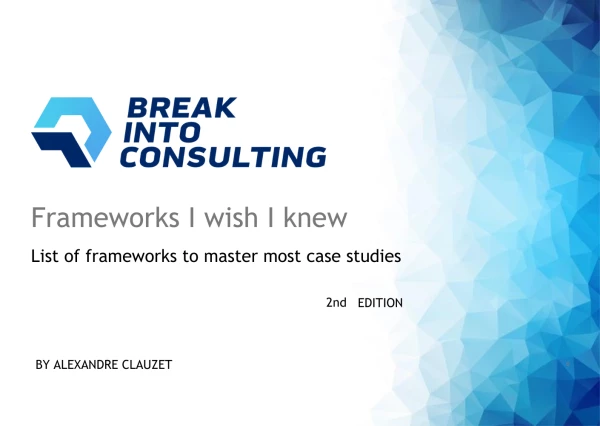Hi all,
Quick question ;
In which Growth Strategy case do we separate the framework into organic vs inorganic ?
In most casebooks I only see the typical ;
increase quantity;
- Same customer
- New customers
increase price
Thanks !
Growth strategy framework


Hello there,
this is a very broad question, it will depend on the type of case you get.
Usually inorganic growth (merging with another company, acquiring a competitor, or forming a strategic alliance with a partner - JV) happens considering time to market, opportunities at hand, lack of expertise, access to new markets and resources, immediate increases in market share, etc. Again, it will depend on the case.
Also, see that the organic growth you have mentioned (price * quantity) is a quantitative way to look at the problem, I suggest you to consider other types of break downs or additional layers depending on the context, e.g.: the Ansoff matrix.
Best,
Mari

I strongly discourage memorising “frameworks”. There is no situation in which a framework “works”. At the highest level, you won’t find cases that fits a singular framework.
Focus on what makes sense for the specific case you are doing. Frameworks should only be used as reference for elements/themes you could consider.
See examples of two responses candidates give and you can quickly tell who’s trying to force for a framework (assume there’s info that could suggest organic not having been useful):
Candidate A: I think we can approach this by looking at organic vs inorganic growth. For inorganic xxx…for organic xxx
Candidate B: It seems our client has little success in organically growing, I think we can approach this considering a few alternative growth approaches, namely
•xxx
•xxx
•xxx

Hi,
I would highly discourage to use the typical framework you are mentioning. The exact framwork you need to use is depending on the case and goal. Best way to determine is by asking clear clarification questions. Note that there are other growth levers like product, distibution channel, location ...
I have some real cases focusing on growth strategy and all have a different framework.
Let me know if you would like to practice together.
Mattijs

Hi there 👋
When it comes to Growth Strategy I can think of two main use-cases:
1) Type of opportunity (most commonly used): (a) Organic development means growth through whatever is in the Company core i.e. doing more of the same or trying a new things vs (b) inorganic being M&A activities - instead of waiting years of gaining market share through organic development you can buy a competitor with x% share
2) Financing activities (rare, PE / financial cases): another case where I see this organic / inorganic distinction is how you would like to finance your Company development, you can do that using (a) your own money - organic (equity) or (b) using debt financing / IPO, etc. (money from banks, inwestors - inorganic way)
Hope that will help, best of luck!

Great question - and one that most casebook answers get totally wrong.
Let’s get something straight:
Organic vs. Inorganic is NOT a growth lever.
And including it next to real levers like pricing, customer segments, or volume drivers will immediately flag you as someone who’s memorizing frameworks, not solving problems.
Here’s what you need to understand:
Organic and Inorganic are not what you do.
They’re how you do it.
They’re modes of execution - not categories of growth.
For example:
→ You want to enter a new geography?
You can build (organic) or acquire (inorganic).
→ You want to launch a new product?
You can develop it in-house (organic) or buy a player with the capability (inorganic).
Literally any growth lever - price, volume, segments, products, geographies -
can be pursued either organically or inorganically.
So what’s the better structure?
Start by breaking down the actual growth levers:
- → Launch new offerings
- → Expand into new segments
- → Enter new markets
- → Increase penetration
- → Adjust pricing
- → Improve retention
Once you've mapped those out,
then layer the execution mode (organic vs. inorganic) on top as an overlay dimension.
That’s how top-tier candidates think.
Hope that helps.
Sidi
___________________
Dr. Sidi S. Koné
Former Senior Engagement Manager & Interviewer at McKinsey | Former Senior Consultant at BCG | Co-Founder of The MBB Offer Machine™

Hi there,
Please provide us with a bit more context so we can give you a helpful answer.
In general, I would avoid any 'typical' situations or frameworks or any means of generalising the frameworks. If you are aiming for a distinctive performance - which you should, considering how competitive these interviews are - then you should be focused on tailoring and first principles thinking.
Best,
Cristian








